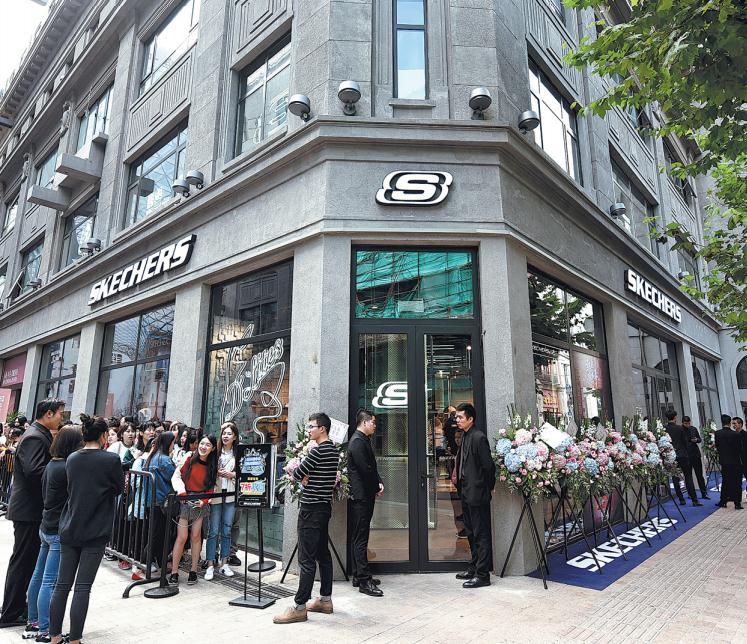Skechers China head sees brand set for success
By Ren Xiaojin | China Daily | Updated: 2019-02-13 07:51

Editor's Note: The Third Plenary Session of the 18th CPC Central Committee held in November 2013 decided to comprehensively deepen the country's reform and opening-up. China Daily is interviewing top executives of well-known multinational companies for their views on the country's socioeconomic development during the past five years.
Sportswear-maker growing at double-digit pace in Chinese market, riding wave of wealthier millennials and online innovation
Sportswear-maker Skechers hit the ground running in the Chinese market a few years back, and has been growing quickly ever since.
The dark horse brand has maintained an eye-catching double-digit average growth pace in recent years, driven by the strong expansion of both its brick-and-mortar store network and its online channels. And it has showed no sign of slowing down.
On Jan 19, Skechers launched its latest superstore in Shenyang, Liaoning province, to welcome another robust year in China.
Willie Tan, CEO of Skechers China, South Korea and Southeast Asia, said he is full of confidence for the future to come, adding he believes the brand will be the winner in the market no matter what uncertainties lie ahead.
China has made progress in streamlining government functions to raise efficiency. Has this move helped the development of Skechers in China?
This move is helpful for Skechers as the processes for new store openings, supervision and protection in China have all become more efficient. Instead of simply pursuing scale expansion, the Chinese government is paying more attention to improving quality and efficiency.
There is another aspect that really helps us. Over the past years, we have seen the Chinese government increasingly address intellectual property issues.
We won a lawsuit last year on IP. We also raided a lot of counterfeit factories, showing the government is listening to us.
How has the country's ongoing supply-side reform affected economic growth and your company's business in China?
The consumer market is changing and the government is supporting people to spend more money, such as by restructuring the tax system. They are making the country a better place.
Skechers is doing well in China. Millennials are a big influence on how the brand should adapt to China. Chinese consumers have not slowed down. It is their behavior that is changing.
Such changes are creating a win-or-lose situation in the market: If you know how to adapt, you win. I believe Skechers will be the winner.
Also, when the infrastructure is complete, China's third and fourth-tier cities will contribute much more to the entire economy.
Older people might think, "we are not going to those cities to sell" because they assume that people in those cities cannot afford the products.
That is not true anymore. There is so much potential in third, fourth, fifth and sixth-tier cities.
How do you view China's policy for foreign enterprises and foreign investment? How can the country further improve its business environment for foreign investors?
The investment environment in China is becoming better and better. There is huge demand from the Chinese market, as Skechers had achieved six years of double-digit sales growth by 2018.
Right now, this market is the fastest-growing globally for Skechers. Obviously, a profitable market is a good market for us.
The business environment is also becoming better and better. It is more convenient to plan store openings. The environment is more transparent, which helps in solving business problems. And local governments are now focusing on long-term development instead of immediate results.
What's your advice for China to achieve more sufficient and sustainable economic development?
I think the biggest challenge to China's business development is reputation. A brand, a business, an industry, a region, or even a country's business development needs a strong reputation.
People want a quick win. They open a company to list it and make products for mass production, etc. It is difficult to have a 100-year brand and a century-old store. Why? Because they all want to succeed fast.
People think wealth is the only way to measure success. But we are not only here to promote a brand, but also to improve people's living standards. We should promote social progress and contribute more to corporate social responsibility.
In this respect, some shortcomings remain in China. Just like my father often reminds me: "Don't forget your roots and keep always repaying our country."
How do you see China's role in promoting globalization and multilateral trade? What's your view on trade protectionism?
I'm very pleased that China has developed many free trade bilateral or multilateral trade agreements with, for example, the Association of Southeast Asian Nations region. Now we can look into more ASEAN countries, which can significantly help Skechers to grow.
So, we are in a very good position as China has taken a global trade approach. The more free trade deals it makes, the more China will do for the world.
What's the biggest challenge China faces today and how can the country overcome it?
The trade dispute between China and the United States. I think as long as the US is reasonable, the trade dispute will be solved. If not, China can take the hit and Chinese people are ready to take the setback.
The Chinese government has prepared its strategy and is prepared for the worst. If the negotiations are successful, the Chinese economy will be very good by 2020.
I believe China can survive whatever the challenges are today.
How has innovation changed China's economic development and your company's business in the country?
In China, the innovation that impresses me most is the use of the internet. Today in our annual sales volume, online sales contribute 36 percent, and that figure is still growing.
This innovation has completely changed Skechers' development in China and it is amazing.
Companies like Tencent and Alibaba have invested heavily in technology, and we have been working very closely with them.
Skechers actually was recognized as a Brand of Influence in the New Retail fashion industry by Alibaba in January. Data is cheap today, but accurate data used correctly is the most valuable data.
We also share offline behavior data with our partners. It has been developing very nicely

CV
Name: Willie Tan
Nationality: Chinese
Age: 64
Career:
2018-now: CEO of Skechers China, South Korea and Southeast Asia
2008-now: CEO of Skechers joint venture, Chaps, LeSportsac in China
Other positions:
2018-now: Deputy CEO of Luen Thai Group Ltd
2017-now: CEO of Luen Thai Enterprises Ltd
1985: Joined Luen Thai Group's apparel division
Education:
Bachelor's degree in business administration from University of Guam
























